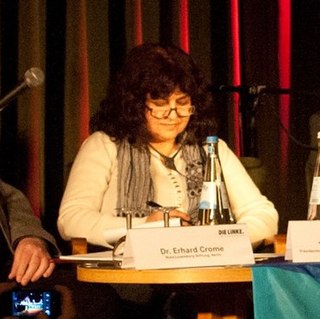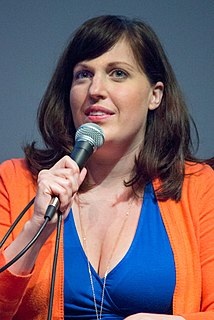A Quote by Elizabeth Gilbert
When I read the article [in The New Yorker] by David Grann, I was very struck by people responding to the article, of people thinking I was such a hero and what a wonderful person I was, and I didn't feel that at all. I felt like I had very much, like Todd [Willingham], taken a path of self-preservation.
Related Quotes
Someone asked me if I would like to write a man on death row, be a pen pal, and I was like, sure. I volunteered. I had been in a place in my life - a relationship had ended; my parents were getting elderly - I was kind of adrift. The name that was given to me, just randomly, was Todd Willingham. And he wrote me a letter, and in this letter, he thanked me for writing him and [said that] if I would like to visit, he would put me on his visitor list... I was just really struck by the letter from Todd. It was very polite; it was very kind.
I'm not sure Riot Grrrl would have been as big a deal if the Internet had existed back then. Because there's so much stuff on the Internet. People could have been like, oh, whatever, I'm going to go look at pictures of Barbie vaginas, you know what I mean? There's so many different things on the Internet, you read one article and then you read something linked off that article and you go down the rabbit hole.
I think that ‘New Moon’ was my favorite book as well mainly because I like the juxtaposition of all sudden people being…it’s such a hyped character, Edward, and there are so many people looking at him like a romantic hero. In ‘New Moon’, the way that I read it anyway, he’s just so humbled. It’s a character who’s looking at Bella and thinking that he loves something too much but he can’t be around. He deliberately starts breaking up their relationship which I think is a very relatable thing and I think is very kind of painful.
I was kind of amazed because I first found out about blue boxes in an article in Esquire magazine labeled fiction. That article was the most truthful article I've ever read in my life... That article was so truthful, and it told about a mistake in the phone company that let you dial phone calls anywhere in the world. What an amazing thing to discover.
If you don't connect yourself to your family and to the world in some fashion, through your job or whatever it is you do, you feel like you're disappearing, you feel like you're fading away, you know? I felt like that for a very very long time. Growing up, I felt like that a lot. I was just invisible; an invisible person. I think that feeling, wherever it appears, and I grew up around people who felt that way, it's an enormous source of pain; the struggle to make yourself felt and visible. To have some impact, and to create meaning for yourself, and for the people you come in touch with.
I think that more so, my wonderful skill of dissociation came in very handy. I care very much what other people think. I'm a total pleaser. I want everyone to like me all the time. I feel like people who don't feel that way on some level are lying, but particularly female memoirists. We want to be seen and we want to be forgiven. So that occurred to me very early on.
I would say most people assume that I'm not very smart or educated or earnest, because I have this image that I'm sort of narcissistic, chasing attention, and wanting people to like me. It makes me laugh because I've done plenty of interviews and when you read the article from beginning to end you can see that I'm not your typical music video model.




































